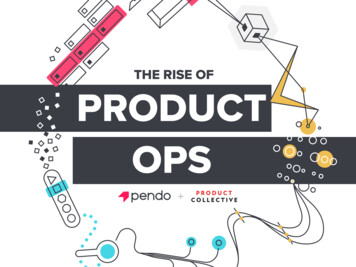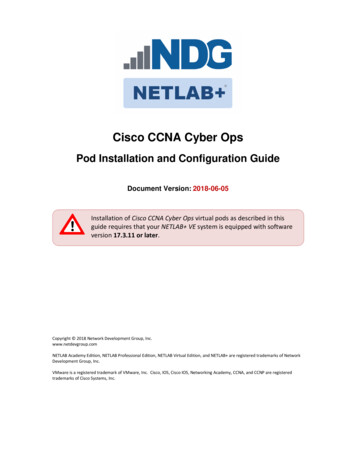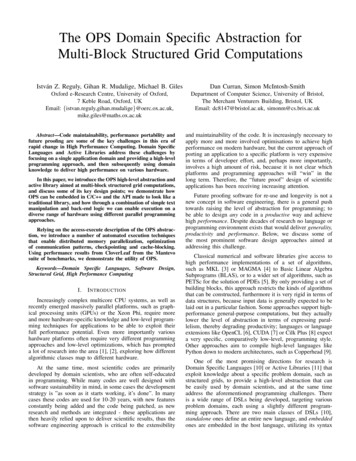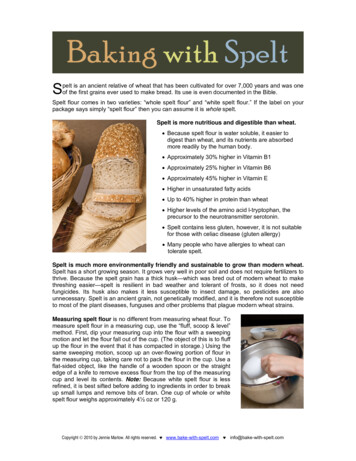
Transcription
THE RISE OFPRODUCTOPS
2IntroductionProduct operations (product ops) isn’t necessarily new, but itisn’t exactly commonplace, either. For technology companiesthat are scaling, it can be the difference between successfulgrowth and growing pains. It’s simultaneously novel (applyingthe ruthless efficiency of sales operations to the R&D function)and familiar (what successful company doesn’t have an opsfunction?).You don’t hear about product ops as often as you hear aboutmarketing operations (marketing ops), sales operations (salesops), or their amalgam revenue operations (RevOps). Evendevelopment operations (DevOps) is prevalent throughouttech. But we think this could change, and product ops couldsoon find itself on equal footing with its popular predecessors.To better understand the state of product ops, what the roleentails, why it matters, and where it’s going, we partneredwith Product Collective to interview professionals from thefield, whether they perform the function themselves or workat companies with a product ops department.The biggest takeaway?This is a critical time for product ops.And the sooner companies start torecognize this, the better for them.
301SectionPRODUCT OPSPRODUCTENNGIEINERCUSS TOUCC MEESS RAt its core, product ops is the intersection of product(including product design), engineering, and customersuccess (CS). It exists to support the R&D team andtheir go-to-market counterparts to improve alignment,communication, and processes around productdevelopment, launch, and iteration.GWhat is product ops?
4But every company defines product ops differently, likely due to the novelty of therole, and the fact that every team, product, and business has unique needs.Product ops is about settingup a system in the productorganization to get the rightdata — both quantitative andqualitative — from the rightplaces into the process forcreating better products.Melissa Perri /// FounderI define product ops asbuilding the connectivetissue between the teamsbuilding your technologyand the teams who interactwith your users.Blake Samic ///Head of Product OperationsIf you’re building an audio systemand the volume knob is the product,then the equalizer settings are theproduct ops function. You can turnup the volume, but the settings— the tweaks, the configurationsneeded for that perfect productexperience — is what I define asproduct ops.Varun Ramamurthy Dinakur ///Founder & CEO
5Product ops’ specific responsibilities can also look very different at different organizations, depending on what’s most importantfor the business. Consider these three different models for product ops:Outcomes-drivenAt Uber, product ops is responsible for gathering insights and scoping out the businessneeds at the very beginning of the product development process (which often includesgoing out and talking to users), as well as at launch time, working with their opscounterparts around the world to execute launches and go-to-market strategy.Efficiency-focusedAt Stripe, product ops exists to deliver more value to more users faster, and has threeareas of focus: strengthening product feedback loops, operationalizing products, andscaling product knowledge across the organization.Customer-centricWhen Theresa Baker started in product ops at Comcast for their Digital Home product, herrole was more of a customer experience function that provided insight into the end-to-endcustomer experience through a product lens.
6I see product ops reporting to the head of productmanagement, and existing as a shared resourceacross the product management organization.Robert Hatta /// Talent PartnerWhere does product opsfit in an organization?If it’s a defined role, productops typically sits in the productmanagement team or in an adjacentfunction that also reports up to thehead of product.When I think about product ops, it’s the role itself— which for us is the product operations manager— but it’s also the team of product ops people thatare connected with each other. By working together,it allows us to drive a lot of really interesting andimpactful initiatives across the entire company.Blake Samic /// Head of Product Operations
7The shadow product operativeSome may think of product ops as strictly a role that companies hire for. Others may view it as a skillset that any productprofessional can (and should) hone. We see it as both — product-led organizations should designate someone to be responsiblefor product ops, but, at the same time, all members of the product team should develop an operational mindset.According to LinkedIn, product operations is related to a sprawling set of roles, including growth product manager, productdevelopment associate, business operations analyst, product manager, and customer impact manager all appearing as results, inaddition to product operations manager and analyst. The dust appears to still be settling. 8% YoY5,700LinkedIn users with aproduct ops titleThere are nearly 5,700 LinkedIn userswith a product operations title — anincrease of 8% in the last year alone. Buteven more noteworthy is that productoperations as a skill on LinkedIn is up 80%year over year. The dust may be settling,but there certainly is a lot of it.20182019 80%LinkedIn users withproduct ops as a skillMr. Hatta summarized the state of product operations well when he said, “There’s clearly a need for this function, and it’s probably a needthat a lot of companies who have scaled successfully have solved for, but they might just be calling it a variety of different things.”What can we learn from this? Although the product operations title isn’t as concentrated as other ops roles, product professionals recognizethat ops is on the rise, and are starting to position themselves for the role. The next question is why now?
802SectionWhy is product ops onthe rise, and why now?We believe product ops is on the rise for a fewreasons: heightened expectations on the customerexperience, the rise in ops roles in general, thegrowing availability of product usage data, and,most notably, the enormous advantage product-ledcompanies have over their competition. Studieshave found product-led companies’ profit marginexceeds peers by upwards of 527 percent — andproduct-led companies are disproportionatelylikely to employ a product ops leader or even anentire team.I think that product ops is definitely growing inimportance, especially in the sense that techcompanies are growing faster now. From myperspective, it’s not that product ops hasn’t beenimportant in the past, but that companies haven’tcome to the conclusion that it makes sense togroup these responsibilities into one role or team,and that it’s actually more efficient that way.Blake Samic /// Head of Product Operations
9The evolution of the product experienceThe “other ops”For product-led companies, the product isn’t just part of thecustomer experience — it is the experience. From trial andpurchase all the way through onboarding, expansion, and referrals,product becomes the vehicle for all of those stages. And productops is central to the optimization of that experience, especiallyas the product development lifecycle continues to evolve.In the last five years alone, there has been a growing conversationaround the importance of operations functions. Regardless ofwhich team they serve, the reason for an ops function usually boilsdown to three key outcomes: better visibility and collaboration,increased efficiency, and more output.In the past, product managers struggled with projects taking waytoo long (or worse: not being completed at all) and coming inover budget. This notion gave rise to the agile method, enablingproduct teams to ship projects on time using shorter sprints tocontinuously iterate. Then the question arose: how do we getthis in our customers’ hands faster? The formation of DevOpseliminated this friction and companies were able to releaseproducts more often — shipping products weekly, or even daily,with a single press of a button.Which brings us to now. As teams build and release more, howdo they know if they’re building the right things? And how dothey ensure users know about everything they’re building? That’swhere we see product ops coming in: optimizing the productdevelopment process and the customer experience to ensureusers get value from the product, and internal teams are educatedand enabled to do their jobs efficiently.Since we see product ops as the latest addition, it’s helpful to thinkabout the ops roles that are already widespread and accepted:SALES OPSREVOPSMARKETING OPSDEVOPSJeff Bussgang, a VC who wrote a post on how sales operations isthe secret to scaling for startups, captures the rise in ops rolesperfectly: “As companies stabilize their business models andfind product-market fit, they begin to adjust from a hunch-drivenoperating model, where decisions are made by the foundersin large part on gut instinct, to a metrics-driven model, wheredecisions are made by professional managers based on data.”
10The rise of dataWith more data available than ever before, we’re in the middle of what some are calling the “datafication” of everything. Techorganizations are realizing that using data to drive business decisions is no longer a reach goal, but a must do — making an operationalfunction critical to analyzing data and turning it into actionable insights.And since product data is the cleanest data in any organization (there’s no opportunity for it to get altered by human-input error ormessy append services), it can be even more impactful for the business. Gartner predicts that by 2021, 75% of software providerswill rely on insights from embedded software analytics to inform product decisions and measure customer health.With today’s marketconditions and the sheeravailability and rise inpopularity of data — I reallythink there’s a correlationthere with the rise inproduct ops.Shelly Perry /// Operating PartnerNow, we’re past that hurdleof ‘I can’t get data out of mysystem,’ and we have so muchdata in all different places— and I think product ops isabout pulling it all together tosynthesize that data and turnit into insights.Melissa Perri /// Founder
1103SectionThe product ops roleWe’ve identified five core areas of the product ops role. They include:1. ToolsOps pros tend to take ownership of tool selection, integration,and maintenance of their team’s tech stack. And product opsis no different.MANAGE THE PRODUCT TECH STACKProduct ops owns the product team’s tech stack, managesrelationships with vendors, and administers these tools to thewider team. Here’s a visualization of many of the tools (andvendors) used by product managers today:ESTABLISH BEST PRACTICES INTERNALLYProduct ops is also responsible for technology selection,establishing best practices for usage, and ensuring teammembers are using their tools effectively.ProductCraft
122. DataMAINTAIN DATA INTEGRITY, CLEANLINESS,AND ORGANIZATIONWith this increase in tools comes a corresponding increasein the amount of available data. The challenge is surfacing,organizing, and analyzing that data in a thoughtful way.Product ops is about helping peoplebetter understand the power of thecombination of multiple data sources— that’s what drives the businessforward. One by itself isn’t enough.Shelly Perry /// Operating PartnerTo me, product ops is all aboutanswering the question ‘Howdo we get product data into theprocess for making product strategydecisions?’Melissa Perri /// FounderFor a data-driven product strategy to be effective, thereneeds to be a strong foundation put in place so that the datais accurate, easy to understand, and useful. Putting a singleperson or team in charge of this helps eliminate problems likedata duplication, or product managers not knowing where togo for certain information.Melissa Perri explained this well with an example, “In an idealworld, a product manager should be able to log into somesort of system, ask a question and get the answer if that datais available, or be able to request the data from product ops.”Product ops might also partner with product managers toset up the measurement and reporting structure for productreleases, and then make sure that data is fed into the rightplaces.
13PERFORM DATA ANALYSISProduct ops not only plays a critical role in collecting data, but also in using it to surface insights that will inform product decisions.One example of this could be reconciling usage data with customer feedback, whether it’s passed along through customer successand sales team members or submitted by the users directly to the product team.It’s not the usage data by itself. It’s the usagedata, plus the financials, the movement in themarket, your win-loss areas, what’s coming infrom support, what your competitors are doing.[.] It’s this massive correlation of the data thatactually makes a difference — it’s not just aboutthe one data source you might already have infront of you alone.Shelly Perry /// Operating PartnerIf you’re a product leader entering a planningcycle, you should be looking at things like usagedata, but you also want to look at what hasbeen submitted by your users — the pain pointsthey’ve mentioned in support tickets, or throughyour sales team and account managers. Youneed to have good systems in place to captureall of that information, structure it, organize it,and tag it, so you can then surface it at the righttimes in really high impact ways.Blake Samic /// Head of Product Operations
14What kinds of data does product ops care about?Product stickiness (DAU/MAU ratio, WAU/MAU ratio)Product usage dataBreadth (e.g. number of active users for a given customer)Depth (e.g. feature usage)Frequency (e.g. number of logins for a given customer)Feature adoption ratesFeature retention ratesNPSLeading indicators of conversion, renewal, and expansionTop feature requestsProduct delivery predictabilityProduct bugs (e.g. broken down by feature and product usage)Product performanceSupport ticketsCustomer feedbackUser research dataWin/loss analysisChurn dataCost dataRevenue dataPROVIDE DATA TO NECESSARYSTAKEHOLDERSOf course the value of this data hinges onit reaching the right people at the righttime. Product ops needs to set up effectiveworkflows and cadences for delivering thisinformation (and avoid just fielding one-offrequests) — for example, supplying productusage data to customer success, allowingthem to pre-identify at-risk accounts.
153. ExperimentationAccording to Robert Hatta, one of the biggest benefits ofhaving a defined product ops role is eliminating friction inthe experimentation process, which allows product teams torun more experiments. For an organization looking to scale,this is essential.KEEP TRACK OF ALL EXPERIMENTSAt the most basic level, product ops should keep track of everyactive experiment, and make sure they aren’t overlappingor interfering with each other. Having this single source oftruth is also beneficial for the broader team, since it acts asa resource that they can refer to at any time.Think of product ops as two roles at an airport:running launch logistics on the ground tomake sure all the planes are taking off in themost efficient way possible, and performing airtraffic control to make sure the planes aren’t allrunning into each other once they’re in the air.Robert Hatta /// Talent PartnerSTREAMLINE SEQUENCING AND IMPLEMENTATIONOF EXPERIMENTSProduct ops should also be creating processes to help makeexperimentation more efficient, for example by establishingworkflows, putting together documentation, segmenting userpopulations, and making sure the data you’re getting back isclean and accurate.In an article for First Round Capital, the co-founders of Redditnote that their product ops team is also responsible for makingsure every experiment aligns with larger company goals.
164. StrategyProcesses will differ depending on how teams are structured, but it’s imperative for product ops to align with other teams across thecompany, and be the inter-departmental link that drives collaboration around the product. By providing product insights, productops works with other teams to identify areas for improvement and inform business decisions.PARTNER WITH OTHER TEAMS ACROSS THE COMPANYProduct ops is a key partner for teams like RevOps, DevOps,CS, marketing, sales, and of course, the wider product team.These relationships will vary by company, but here’s what itcould look like:Working with marketing to hone persona definitions,ensuring the leads generated match the characteristicsof the company’s most successful users.Aligning with RevOps to ensure product data is incorporatedinto business health metrics, especially with respect totrial conversions, renewals, and expansions.Monitoring customer feedback channels and thenfeeding that information back to the CS team andproduct owners.Partnering with DevOps to advise on roadmapping,based on data and feedback from the field.Defining performance experience metrics in partnershipwith the quality assurance team to better measuresuccess around the product experience.
17SCALE PRODUCT KNOWLEDGEAt Comcast, the reason Theresa Bakerstepped into her role in product opswas to help ensure tighter alignmentbetween product and the teams (i.e.sales, marketing, and CS) responsiblefor preparing the organization for newproduct launches.Matt Shroder explained that at Uber,each product manager has a productops person who they align with to kickoff the “request to build” process for anew product or feature. They first talkthrough what they’re looking to build,and then product ops collects a morerobust report of customer pain pointsby engaging their counterparts aroundthe world. Since Uber is such a large,global company, their product opsteam is dispersed in different markets,and often rely on each other to shareinsights to inform product decisions.Since they are in sync with teams across the company, product ops becomes thebest resource for things like product information, new learnings, and the stateof the roadmap — and they should be proactive about sharing these insights.Product ops can be expected to answer:What are the top priorities across all product teams?Where does X fall on the product roadmap?What are the top X needs from Y customers?What are the top X at-risk customers?Where is the discovery/feature/release brief for X feature?5. Trusted advisorAs companies scale, there’s a need for leadership to have enough informationto make decisions, especially when it comes to decisions about the product.The product ops team (or person) is a key advisor for CPOs, VPs of product,and other R&D leadership of the like — for example, by using data to advise onthe roadmap or supplying product health data to the executive team.Product ops needs to be able to get leadershipthe data that they need to make productdecisions, not just the data they ask for.Melissa Perri /// Founder
1804SectionHow does product ops impact therest of the company?One of the biggest impacts product ops can make is taking administrative andorganizational tasks off product managers, so they can focus on improving the product.With this comes some more specific effects, which we’ve outlined below.Shifts in ownershipWhen a product ops function is introduced, expect a natural shift in responsibilitiessince the diffuse, ops-y projects product managers took on in the past will now beconsolidated into one person or group.Here are a few examples of what might shift to product ops: Gathering and organizing data: product ops becomes the keeper of all product data,including collecting it from multiple sources and sharing it with the right people Running experimentation processes: this takes the burden (and intricacies) of thingslike managing experiment schedules and segmenting users off of product managers Collecting customer feedback: by delegating this to a single person or team, it helpskeep the feedback collection process consistent and scalable Training and enablement: product ops can use their product expertise to train salesand CS teams on any new products or updatesTraditionally, productmanagers were responsiblefor finding data from eachpart of the organization ontheir own. I see productops taking over that entireprocess.Melissa Perri /// Founder
19Cross-team communicationSince product ops serves as the product expertfor other teams across the company, thosecommunication channels are clearly definedand in an ideal world, everyone knows how andwhere to get the information they need.In addition to better-defined communicationchannels, product ops also serves as a singlesource of product expertise, which improvescommunication around the product itself.Traditionally the ops function has livedoutside of the product team. Having adedicated focus embedded within the DigitalHome product organization has allowedcloser partnerships to be built to help ensurecritical elements of go-to-market success (i.e.support tools, communications, and training)are complementary and reflective of the fullproduct experience.Theresa Baker ///Senior Director, Product ManagementIncreased efficiencyA natural result of better communication is greaterefficiency: when people know where to go forinformation and can find what they need morequickly, they become more efficient. And whenproduct managers and product owners aren’ttasked with things like creating sales materialsfor new features or reporting on product metrics,they can build and release more, and do so ata faster pace.The way I like to describe it is that we kind ofran interference for the product owners. Weallowed them to focus on what they truly wereresponsible for, which was defining the productand advancing the roadmap, rather than gettingpulled into operational tasks and projectsrelated to bringing the product to market.
20Connecting product to the bottom lineWith product ops in place, organizations are better able toconnect product decisions with their overall business strategy.Within the Digital Home product team at Comcast, the opsteam helps identify ways to drive key business objectiveswhich positively impact the bottom line. For example, theyhelp define product enhancements to address customerissues that may be driving support calls or technician visits,as well as identify enhancements to frontline tools for moreefficient troubleshooting, resulting in operational savings forthe business.
2105SectionWhat does the future look likefor product ops?Product ops is simultaneously an emerging role, and one that has been around for decadesin one form or another. So, what’s on the horizon for product ops?It was clear that product ops is on the rise:As more organizations turnto a data-driven approach— which every companyshould be doing— I thinkwe’re going to see this rolebecome an absolute criticalcomponent of any companythat has a technology team.Melissa Perri /// FounderI think we’ll start to see moreand more people specializingin product ops, even at thecollege level. There’s so muchopportunity there, since productis becoming increasinglyimportant for topline businessmetrics, and is now viewed as arevenue-producing function.Just like the market for salesops tools is a lot more maturethan it was ten years ago, I thinkthe number of tools availablefor product ops people willgrow. Every layer of the salesfunnel has a best-in-class tool,and I can see that start todevelop within product as well.Shelly Perry /// Operating PartnerRobert Hatta /// Talent Partner
22I think the full end-to-end product ops function will comeabout by the merging of two teams: the team that focuses onproduct analytics and user analytics — which I’ve seen moreand more through roles like “product analyst” — and the moretraditional product ops team that does things like insightsgathering, requirements process, and execution of the go-tomarket strategy. And my expectation is a lot more of thesetypes of teams will merge in the future.Matt Shroder /// Head of Product OperationsBut also that the role isin for some changes:I see product ops becoming more of a strategic role withinproduct teams. A lot of companies try to set up their techorganization in a way that almost feels like a bunch ofdifferent startups. These teams typically have a productleader, an engineering leader, and I see the productoperations manager role becoming the ops leader, almostlike a mini COO.Blake Samic /// Head of Product Operations
23I wouldn’t say tech companies have fully embraced product ops,but I think they’re starting to embrace certain facets of the role.The word ‘ops’ also has a little bit of a dull connotation to it, soI don’t know if it’s going to be called product ops or somethingfancier, but I think we’re going to see the role in different formsand names — whatever makes it look and feel like this is a reallyimportant function that’s moving the business forward.Varun Ramamurthy Dinakur /// Founder & CEOAnd there was also anotion that product opsstill has a ways to go:I think the definition of product ops can be evolved toencompass a broader focus on the customer experience.At the end of the day, we’re doing everything in service ofthe customer, so there has to be that end-to-end customerexperience lens to approach all of the elements of the role.Theresa Baker /// Senior Director, Product Management
2406SectionAdvice for getting started with product opsIt wouldn’t be right to collect all of this information about productops without sharing these experts’ firsthand advice for launching(or improving) a product ops function.What makes for a successful product ops person?If you’re thinking about hiring a product ops person (or team), think of these as the characteristics to look for. And if you’re wonderingif you may be a product ops practitioner in hiding, use this list to self assess to see if you’re a good fit for the role.1. Analytical/data-oriented2. Comfortable with systemsProduct ops people need to be pros at taking data andturning it into insights, as well as analyzing informationfrom multiple data sources and being able to identifywhat is the most impactful.Product ops people should be good at understandingand using (which often includes learning) a variety oftools in their day-to-day.
253. Collaborative6. Business acumenCollaboration was another top skill mentioned acrossmany of our interviews. Or as Blake Samic puts it,the ability to be a “collaboration catalyst”: someonewho can be put into a group of people and make thewhole group more collaborative.Since product ops aims to connect the product witha company’s business priorities, sound businessjudgement is an important foundational skill to look for.4. Great communicators7. Product-orientedThis includes written, verbal, and in-person presentations.The product ops role is going to be relaying informationto many different teams, all the time. Melissa Perrisaid product ops also needs to be especially good atcollecting information and presenting it in new ways.Product ops people don’t necessarily have to have aproduct management background, but they shouldhave a general understanding of what a productteam does (and able to learn the ins and outs of yourproduct quickly).5. Entrepreneurial8. LeadershipWe also heard things like action-oriented and able tostructure something that’s ambiguous. Matt Shrodernoted that product ops people need to be comfortablewith ambiguity in general.Not every product ops role will have direct reports,but they need to have a scaled impact across differentfunctions of the business, which requires them to beleaders in their own right.
26How to get startedWondering where to start? Here’s what some of our interviewees suggested:Like with all things, if youmake it too big at the verybeginning and set up toomany expectations, yourun the risk of failing in anequally big way. My advicewould be to start small,show some results, and itwill catch on.Shelly Perry /// Operating PartnerI think you should startthinking about product opswhen you’re still small, sothat you can orient yourselftowards scaling well. Youdon’t want to be a companyof 500 people and not havethe right processes in place.Melissa Perri /// FounderI think you could have a scaleddown version of product opseven at a very small company.In that case, you mighthave more of a centralizedgroup that’s thinking aboutthese things rather than theembedded role within theproduct organization.Blake Samic ///Head of Product Operations
We've identified five core areas of the product ops role. They include: 1. Tools The product ops role Ops pros tend to take ownership of tool selection, integration, and maintenance of their team's tech stack. And product ops is no different. ProductCraft MANAGE THE PRODUCT TECH STACK










